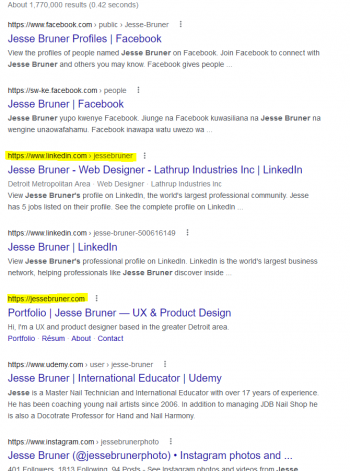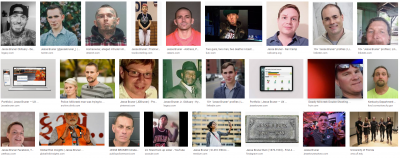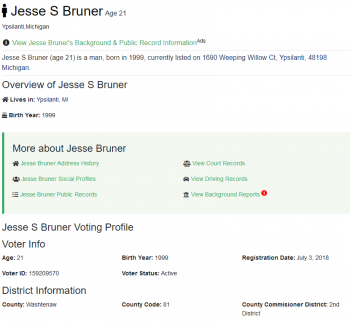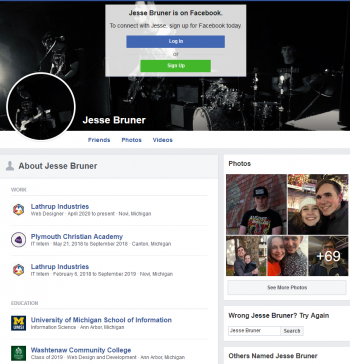Jesse Bruner
Contents
Discovering my digital identity
Google search results
The first step I took was to see what kinds of results showed up about me on Google. The first search query I used was "Jesse Bruner" and I dug down through the first 15 pages of results. The result? I found 7 results which related to me: my LinkedIn, my personal website, my old and unused Twitter account, my GitHub, one of the Medium posts for this class, a random post on a help forum, and my name referenced on the Lathrup Industries website (my workplace). This was mildly surprising to me that so few results were revealed. I've never been very active online, but in truth I expected to find more.
I then tried Google images. In total, I found four images that related to me above the fold and two more further down. A few of the images were related to my social media accounts, and the rest my personal website. One of the more interesting discoveries was that my profile picture from YouTube could be found in the results, which if clicked, linked to my YouTube profile. I also learned a more famous Jesse Bruner was a criminal who was shot and killed by a homeowner of a house he broke into.The last step I took was to try to get my social media profiles to show up in Google. I got my Facebook to show up by searching for "Jesse Bruner facebook" and searching through the profile list. The public page, though certainly limited, does tell a lot about my personal life.
The quest for a data broker
I decided to change strategies and find a data broker. I went to five or six different sites trying to see what information I could get for free. Inevitably, I found nothing. The one hidden gem I did discover was a Michigan records database which included all of the factual details about me: my location, my age, my voter status, etc. Despite the lack of information I obtained, I learned some interesting things that raise ethical concerns. While searching for a broker, the strategy of each site was the same: imply I could get the data for free. Require I spend a couple of minutes while they "fetch" the data. Then, reveal only the most basic of information (name, age, city) and require I pay to reveal the full report. All the while, reviews from "happy" customers were shown. Each review usually played into fear: "I discovered my girlfriend was cheating on me" or "I learned about all of the sexual offenders in my neighborhood so I can now keep my grandchildren safe." Similarly, I was exposed to some of the major data broker companies. The standout to me was Axciom, which repeatedly brought up their "ethical" approach to data and marketing (if one is inherently ethical, they usually need not repeat it over and over).
My digital identity
Painting a picture
There are many dimensions to any individual's life that, on their own, paint an incomplete picture of that individual's identity. Yet when those dimensions are put together they reflect who that individual is. That said, there are two shortcomings of this version of identity: the parts that comprise an individual are nearly infinite and cannot be easily identified. Additionally, who defines what pieces make up the individual? Not even the individual truly understands themselves, nor is their perceptions of themselves accurate to the perceptions of others. To this point, defining the identity of an individual is an impossible task. The identity I try to paint here will fall short of who I perceive I am, which falls short of other individual's perceptions of me, which falls short of who I truly am.
Identity Spheres
From each website, a piece of me can be discovered. On LinkedIn, my website, and GitHub, my professional and academic experiences are at the forefront. From these sites, one could deduce my passion for user experience, my beginner level of programming skills, and my time and experiences at University of Michigan and Washtenaw Community College. In fact, the majority of information available about me online is in these two spheres: the professional and academic. The blog post I found is from this class (academic), my old Twitter was my attempt at fitting into tech culture (professional), the post I found on the random help forum was related to a design tool (professional), and my name referenced on the Lathrup Industries website (professional).
These two spheres, the academic and professional, are also the most surface-level. What does being a student at Umich and a web designer at Lathrup Industries have to do with who I am? I do not perceive my value as a human being as my career pursuits, nor would I describe those spheres as being the most important to me. Important to my livelihood? Absolutely. Important to my perceptions of self? Not particularly.
However, the two other primary sources of information about me paint a surprisingly detailed picture about me. On my public Facebook page, one could deduce my love of music and my time spent playing in bands and performing in shows. My favorite quotes are available, which can tell you a decent bit about what I value. Additionally, photos of me and my girlfriend and other important relationships. On YouTube, if you were to dig through my public information, you would find my subscriptions and playlists. From those subscriptions, my hobbies and interests would be revealed with surprising depth: my love of Magic the Gathering, anime, economics, international affairs, minimalism, and personal finance.
The formation of identity
The first sentence I wrote was "I've always had a limited digital identity." This is true relative to many others of the rich world. Whereas everything about me is not online and so the picture I can paint from my online data perhaps does not capture the nuance of my personality, opinions, beliefs, and interests, it's still surprisingly accurate. When I looked through my data on Facebook, there are some glaring flaws, such as the perception that I am interested in birds, cheer leading, and oranges. But the majority of the interests Facebook thinks I have are accurate, and reveals how the little activity I had on Facebook in the past gave it enough data to understand me on a deep level. So I may not be publicly available for all to see, but I am publicly available for all who pay.
My Identity
But while digging through the web to paint myself a picture of my own identity online, an interesting and existential realization occurred to me: identity is formed through perceptions of oneself, and the perceptions others hold. Typically, they each are built off of each other. The web and online world, and the databases which hold our information, add a new dimension of perception. The perception of the machine. Though not cognizant and self-aware, these online and digital troves of data store all records of who we are. They store what we like, who we know, what we do, what our habits are, what our addictions are, our hobbies, our goals, and our memories. The picture I painted was the publicly available one you can find on the web, but does not paint the picture of all the data I know they have.
If the perception of myself defines who I think I am, the perceptions of others define who they think I am, then the perception of databases are who I actually am. Not in the sense that they fully capture the depth of my humanity, nor in the sense that they represent my scope of experiences, but in the sense that when I am dead, the last remaining perceptions of my existence will be the digital. I will be reduced to the 1s and 0s of information stored on an old server. I will be kept around for maybe a few hundred years until whatever form of ancestry data company decides to free up storage and forget who I am. So despite the ethical concerns of privacy invasion today, the data they collect will frame my identity far longer than my time on this earth.
That's a scary, yet beautiful thing.



